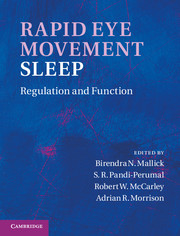Book contents
- Frontmatter
- Contents
- Contributors
- Preface
- Acknowledgments
- Organization
- Section I Historical context
- Section II General biology
- Section III Neuronal regulation
- Section IV Neuroanatomy and neurochemistry
- Section V Functional significance
- 30 Significance of deprivation studies
- 31 Modulation of body core temperature in NREM sleep and REM sleep
- 32 Sleep-related hippocampal activation: implications for spatial memory consolidation
- 33 The role of REM sleep in memory consolidation, enhancement, and integration
- 34 The role of REM sleep in emotional brain processing
- 35 REM-sleep loss, oxidative damage, and apoptosis
- 36 The role of REM sleep in maintaining neuronal excitability and its possible mechanism of action
- 37 Comparison of REM sleep-deprivation methods: role of stress and validity of use
- 38 REM sleep in patients with depression
- 39 Proteins and neuropeptides in REM-sleep regulation and function
- Section VI Disturbance in the REM sleep-generating mechanism
- Index
- Plate section
- References
30 - Significance of deprivation studies
from Section V - Functional significance
Published online by Cambridge University Press: 07 September 2011
- Frontmatter
- Contents
- Contributors
- Preface
- Acknowledgments
- Organization
- Section I Historical context
- Section II General biology
- Section III Neuronal regulation
- Section IV Neuroanatomy and neurochemistry
- Section V Functional significance
- 30 Significance of deprivation studies
- 31 Modulation of body core temperature in NREM sleep and REM sleep
- 32 Sleep-related hippocampal activation: implications for spatial memory consolidation
- 33 The role of REM sleep in memory consolidation, enhancement, and integration
- 34 The role of REM sleep in emotional brain processing
- 35 REM-sleep loss, oxidative damage, and apoptosis
- 36 The role of REM sleep in maintaining neuronal excitability and its possible mechanism of action
- 37 Comparison of REM sleep-deprivation methods: role of stress and validity of use
- 38 REM sleep in patients with depression
- 39 Proteins and neuropeptides in REM-sleep regulation and function
- Section VI Disturbance in the REM sleep-generating mechanism
- Index
- Plate section
- References
Summary
Summary
Interest in the effects of total sleep deprivation dates back over one hundred years. After the discovery of rapid eye movement (REM) sleep in the 1950s, selective REM-deprivation studies have been performed in animals and humans. All studies have shown progressively higher pressure for REM sleep as REM deprivation increases. Studies also show that significant REM rebound occurs after selective REM deprivation and total sleep deprivation. Over the past few decades, newer methods have been developed to reduce confounding factors in REM- or paradoxical sleep-deprivation (PSD) studies of animals but, unfortunately, many findings cannot be generalized to humans. Most current PSD studies employ either the gentle handling or forced locomotion technique, and are most often carried out in rats. Forced locomotion techniques like the disk-over-water method have allowed the study of fairly prolonged PSD in rats. Total sleep deprivation (TSD) in rats leads to a host of sleep deprivation effects (SDEs), including eventual death. Development of SDEs seems to correlate with degree of PSD. Paradoxical sleep-deprivation studies in rats show almost identical results, but only occurring over a longer period of time. REM sleep appears to play a vital role in thermoregulation in rats, leading to considerable hypothermia. The heat-loss theory explains the inverse relationship between energy expenditure (EE) and temperature, which eventually is observed in TSD and PSD studies in animals. No human REM sleep-deprivation studies have indicated such profound changes, though no comparable studies have been conducted. From early on, REM sleep-deprivation studies in humans have focused on the cognitive effects of deprivation. Several studies suggest deficits in short-term memory consolidation with REM-sleep deprivation in both humans and animals, though the issue remains controversial. Recent studies suggest that sensitivity to pain increases with selective REM-sleep deprivation in animals, but no convincing evidence is found in human studies.
- Type
- Chapter
- Information
- Rapid Eye Movement SleepRegulation and Function, pp. 301 - 310Publisher: Cambridge University PressPrint publication year: 2011



